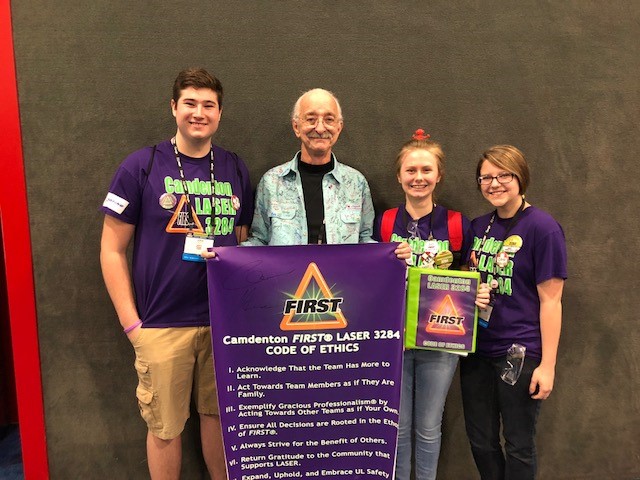How to Help Students Take the Lead in Their Learning Through Robotics
An Afterschool Services Director Explores How Building Robots Builds Kids into Leaders Equipped with Skills for Future Success

FIRST Robotics Competition team "LASER 3284" from Camdenton, Missouri, celebrates winning the top award at the Kansas City Regionals.
As an afterschool services director at a sprawling, rural school district in Missouri, I seek to expand opportunities for students in my district – opportunities that help build them into leaders, discover their passions and become ethical and skilled workers in their fields. I don’t want them to be afraid to jump in and get their hands dirty; they need to be willing to challenge themselves and problem-solve to truly transform and grow.
But in order to get our students there, I also need to not be afraid to jump in to challenges that put me outside my comfort zone. That’s why ten years ago, my husband, who is a teacher, and I started a robotics program in our district, even though we had no idea what we are doing. We launched a FIRST Robotics Competition team for high school students at Camdenton R-III School District, called LASER 3284. FIRST Robotics Competition is one of a K-12 progression of programs offered by FIRST, a STEM education nonprofit founded in 1989 by inventor Dean Kamen.
As I’ve helped build the progression of FIRST in Camdenton, I’ve found there is no better program to develop 21st century skills than FIRST. Hands-on STEM programs like FIRST help students drive their learning while gaining the skills they will use for the future. After a decade as a mentor, coach, and facilitator of FIRST programs for my district, I’ve developed a few strategies for encouraging students to take the lead in their learning through robotics.
1. Create space for students to explore, fail and think
Looking back on my time spent in classrooms as a youth, I wasn’t lucky enough to have robotics or other hands-on STEM programs in my small rural grade school in central Missouri. I was lucky that I had a handful of caring teachers that pushed us to explore, fail and think. I am sure they wanted us to have skills to be successful adults that contributed to society in an ethical way, which is what I want for my students.

Sherry Comer at the Missouri Central FIRST LEGO League Championship.
Giving students the opportunity to understand and work through real-world challenges is an invaluable gift that will prepare them for a successful future. I’ve found that FIRST is as close to a real-world working situation as I can provide for students. In fact, I will go as far as saying it IS real world. Teams are asked to design and build robots to complete specific tasks with limited direction, equipment, financial resources, and time. That leads to plenty of opportunities for failure – and ultimately success.
Failure leads to success, as long as you encourage them to evaluate the following: Why did we fail? Did we do the math, research and plan, and apply good engineering principals? What can we do different/better? All of these questions link directly to the 21st century skills they need to develop, including critical thinking, communication, collaboration and creativity. As a mentor, my role is to help them explore their options, ask probing questions and help them learn from the process of failing and trying again.
2. Give students opportunities to find their passion and gain skills for success
FIRST has become a platform in our school district for students to find their passion: coding, mechanical, fabricating, electrical, computer-aided design (CAD), web design, public oration, graphics, marketing, finances, or fundraising. These areas, among others, can be explored and developed through real-world applications to help students decide what career they want to pursue.
Whether it is attending a four-year university, going to a trade school, or entering the world of work directly, students need these programs to learn not only the technical skills but the important soft skills that employers are looking for. FIRST inspires creativity, communication, collaboration, and critical thinking in my students. No matter how you gauge success, these skills are vital.

3. Inspire students to make advocacy part of their daily lives
Advocacy became a passion of mine early on in my life, and I have tried to inspire students that advocacy should be part of their daily lives. Their opinion matters. In fact, their opinions are vital. I encourage them to research, discuss, and find solutions for the world’s problems. They have learned they can change the world, one “robot” at a time.
I have had the pleasure of working with the National Afterschool Alliance since 2003 as an Afterschool Ambassador. This year, one of the LASER 3284 team members, Maya Irvine, applied for and was selected as one of the organization’s five national Youth Afterschool Ambassadors to promote afterschool and travel to Washington, D.C., to advocate for afterschool programs. As part of her advocacy efforts, Maya produced a video about the progression of FIRST programs in our Camdenton R-III School District, where one in every 14 students is on a FIRST team – out of a student body of 3,600 students.
It was a pleasure to watch Maya grow, learn and promote robotics in her school district as her platform to engage members of Congress and funding for STEM in afterschool 21st Century Community Learning Centers.
I am also proud to say that LASER 3284 has mentored and helped start FIRST at that very small school in my hometown of 201 people. Rural areas are often overlooked due to lack of industry. In those areas, you will often find some of the smartest and skilled members of the future workforce. They have grit and tenacity that others lack. FIRST nurtures and builds on those traits. We should push for more rural funding and encourage smaller schools to become involved in FIRST.
4. Mentor students to become problem solvers who change the world
Usually you, the adult mentor/coach, are not well-armed with all the knowledge you need to build an amazing robot, write a great awards essay, craft an entrepreneurial plan, or write accurate code. So, what do you do? You turn the “problem” over to kids. Kids are remarkably unafraid to tackle problems and share ideas. As students, and later as alumni, they’ll also generously share what they’ve learned with others.

Students from LASER 3284 show the team's Code of Ethics to Dr. Woodie Flowers, FIRST Executive Advisory Board Co-Chair & Distinguished Advisor.
Thanks to the fearlessness and hard work of our students, alumni, and mentors, our FIRST Robotics Competition team has been fortunate to qualify to compete nine out of the last ten years at FIRST Championship, the world’s largest celebration of STEM for students and the culmination of the season’s FIRST programs. Attending FIRST Championship with members of the FIRST community from around the world is both a huge accomplishment and a huge burst of inspiration for LASER 3284.
At FIRST Championship, FIRST Founder Dean Kamen said that sitting in the audience is a student who will cure cancer, who will become the next “big” scientist. I encourage my fellow mentors, coaches, educators and district leaders – from large, urban districts to small, rural schools -- to take the plunge and bring your students a STEM program like FIRST. Help develop the next Einstein, Curie or Hopper – people who weren’t afraid to take the lead in their own learning.
Do we know what we are doing everyday as a coach or mentor? No, but we know the kids will help us figure it out. Along the way, they’re building the self-confidence they need to take the lead and succeed. As my students say (also inspired by Kamen), “We thought we were building robots, but the robot built us!”
If you have an inspiring story or piece of wisdom that you’ve picked up through your experiences in the FIRST community, please reach out to us at inspire@firstinspires.org and inquire about becoming a guest contributor for Inspire.


